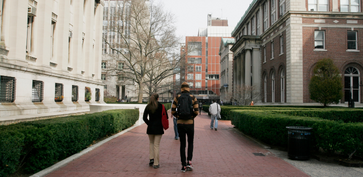Campus Environment
What the campus looks and feels like
The environment on campus is a crucial aspect of your college experience. Campus environments and cultures vary considerably from college to college. For some students, the environment can be just as important as academics in shaping their college experience.
One of the steps in finding the right college for you is deciding what type of campus setting you prefer. You’ll want to consider a broad range of factors such as location, size, cost, academic quality, diversity, campus safety, choice of majors, as well as other factors that are personally important to you.
Some college campuses have a bustling community full of events and student organizations. Others are commuter schools, where very few students, if any, live on campus and participate in extracurricular activities.
Below are some important factors to consider when choosing a college.
You can start with general factors. As you narrow down your list of schools, be sure to ask more detailed questions to find out if that school will be a good fit for you.

What to look for in a campus environment
Below are three factors you should consider when deciding what is important for your college experience.
These are:

1. Institution type
(public school or private school)

2. Location
(rural, suburban or urban)

3. Size
(number of students)
1. Institution type
Here are some factors to keep in mind when considering between a public or private college.
- Class size: Smaller class sizes tend to mean more discussion-based classes and closer relationships with professors and advisers. Larger class sizes can mean a lack of close relationships with professors and advisers (at least until your studies become more specialized).
- Minority-serving institutions: These are institutions of higher education that serve minority populations. This includes Historically Black Colleges and Universities (HBCUs), Hispanic-Serving Institutions (HSIs), and Tribal Colleges and Universities (TCUs).
| College Type | Tuition Price Tag | Class Size | Other details |
| Private (also called independent colleges and universities) | $$$ | XX | The availability of degree programs and activities vary considerably, and degree programs may be more customizable. Tend to have a higher average four- year graduation rate. May lead to a more marketable degree and higher salary. |
| Liberal Arts Colleges | $$$ | XX | Generally aim to give you broad exposure to different subjects and help you build a well-rounded skill set that can be applied to many different career goals. |
| Public Colleges and Universities | $$ | XXX | More degree programs, extracurricular activities, and cutting-edge facilities. Can potentially have a more vibrant campus environment. |
| Historically Black Colleges and Universities (HBCUs) | $$$ | XX | There are over 100 four-year and two-year HBCUs, the majority of which are located in the Southeastern states, the District of Columbia, and the Virgin Islands. HBCUs enroll 16% of all African-American students in higher education and award 24% of all Baccalaureate degrees earned by African-Americans nationwide. |
| Hispanic-Serving Institutions (HSIs) | $$ | XX | There are over 270 HSIs with at least 25% total full-time enrollment of Hispanic undergraduate students. HSIs enroll 40% of all Hispanic-American students. |
| Tribal Colleges and Universities (TCUs) | $$ | XX | There are 35 TCUs that provide a response to the higher education needs of American Indians. They generally serve geographically-isolated populations that have no other means of accessing education beyond the high school level. |
2. Location
Geographic location can have a big impact on your overall college experience. Even if you like the school itself, if you’re uncomfortable with the community surrounding it, the next few years of college could be tough. Check out YouVisit to get a virtual tour and walkthrough of the college campus to get a feel for each of your college campuses.

Rural
Close-knit campus community, on-campus entertainment. Access to nature and recreational activities outdoors. Fewer distractions and fewer temptations to spend money off campus.

Urban
The adventure of life in a big city, more entertainment and cultural events. Increased access to internships, networking opportunities, and careers. Typically, a more diverse student body.

Suburban
Access to various forms of recreation and entertainment. Transportation and connections to nearby cities, providing job and internship opportunities and close-knit campus community. The “best of both worlds.”
3. Size
Judge the size of the school in the context of the surrounding environment. Remember small schools can still be located in a big, bustling city and a big public university can be located in a small town.
 Large college campuses:
Large college campuses:
- Usually have more resources and campus facilities such as athletic facilities, culture and entertainment.
- Large research universities also tend to have large budgets to invest in faculty, classroom technology, and research and development labs for science, engineering and other fields of study.
- Can usually provide more academic choices, including hundreds of different majors and concentrations. This can be especially attractive if you haven’t settled on a major or are looking to pursue an interdisciplinary major.
 Small college campuses:
Small college campuses:
- Can specialize in a liberal arts education or even a certain discipline within liberal arts.
- Campus and the class sizes are typically smaller, and the overall college experience is usually much more intimate.
Some ways you can take advantage of a large school:
- More options means more to research and participate in.
- Be proactive and find the services and programs that meet your needs. This will help you achieve your goals (e.g. tutoring, mental health services, student groups).
Some ways you can take advantage of a small school:
- On a smaller campus, there are opportunities to get to know other students and the faculty intimately.
- Be willing to meet new people, take different classes, engage in groups you may have never considered before.
Some reasons large schools may be a good option:
- You want to have access to a large alumni network when you graduate.
- You are able to take the initiative to regularly visit your academic adviser and make sure you’re on track for your major.
- You feel confident that you’ll be able to find your own community and social connections so you don’t get lost in the crowd
- You want research to be a major part of your education. Undergrad research can be helpful in getting admitted to graduate school.
Some reasons a small school may be a good option:
- You need support and guidance from professors.
- You have trouble recognizing when you need help and rely on your professors to step in when you need them
- You want your professors and classmates to know who you are, and you want to interact with them in small class settings.
- You want less competition for opportunities (scholarships, work-study positions, etc).
- You want the whole school to feel like a close community.
- You actually want to know the alumni of your school so networking is more meaningful.

Accessing resources on campus
Campus environments can vary, so it is important to consider the services available to you. Attending college may be your first time living on your own but that doesn’t mean you are alone in this transition. Knowing which resources are available to you on campus can make this transition a lot smoother.
Most colleges offer campus services that students can use when they need help with personal, social, health, financial or other issues. Here are some examples of services and resources you should look for at your college. They could make the difference between a great and a poor college experience.
Mental and Physical Health Centers
- Can treat illness and injury, give immunization shots, and perform medical tests. Can provide therapy, psychiatric services, and other mental health support.
Counseling Office
- Can provide trained counselors if you’re having a tough time coping with stress, or if you feel isolated or depressed, or have other personal challenges you want to work through. You don’t have to navigate these challenges alone.
Career Centers
- Offer guidance on writing résumés and practicing for job interviews. Often assist students seeking internships, fellowships, and jobs after graduation. Maintain a job board, other employment resources, and hosts career fairs and recruitment events with employers.
Multicultural Affairs Office or Student Life
- Are responsible for fostering an equitable and inclusive campus culture. Offer multicultural student groups (e.g. Hispanic/Latinx, African American/Black, Pride/LGBTQ+, Undocumented).
Commuter Services
- A college may have special services for students who don’t live on campus. Services provided may include: transit passes (may be included in your tuition and fees), student lounges, support in finding off-campus housing, commuter parking and clubs for students, and more.
Check the environment for each college on your list
There is no right answer when it comes to selecting the best college environment. The key is to find which environment will give you access to the experiences, opportunities, and overall atmosphere you prefer, and best set you up for success. Choose the place where you feel you can truly be yourself.
DecidED will help you view the three factors (institution type, location and size) when comparing colleges to one another.
Whenever possible, it’s a good idea to visit college campuses as you build your list. If you are unable to go in person, do a virtual tour with YouVisit or watch student videos on CampusReel. Both of these options will let you view authentic, current student perspectives about the college, activities, and typical student life on that campus.
Here are some questions to ask yourself during these virtual or in-person visits:
- Which campus puts you more at ease?
- Where do you feel comfortable?
- Would you prefer a larger or smaller college? Do you want more or less people to interact with?
- Is it important that you’re able to connect and work closely with professors and advisers?
- Do you want a large selection of degree programs and activities?
The college you decide on could potentially be your home for the next four years. The city or town you choose to settle in will provide you with connections, internship opportunities, and possibly your future career. In other words, only you will know when the campus environment is right. Get insights and perspectives from those you trust, then make an informed decision about what is best for you.








